On the BrotherBored Patreon, fans submit ideas for articles and help me choose which topic I’ll write about next!
The most recent winning topic was:
Finish writing on a Diplomacy topic you’ve had on the back-burner for a while, “Solo Win Tip: Embrace the Powers’ Differences.”
Thank you Patrons for the motivation to finish. I hope this piece is worth your wait!
“Hey BrotherBored…that’s not the title of this post!”
You’re quite right, and I’ll explain myself in a footnote for those who are interested.[1]I originally sketched this piece out well over a year ago (how time flies!), but never got it into a publishable state. The challenge in writing on this topic is that, though the concept is simple, it is difficult to describe succinctly. I think I felt unsatisfied with my prior drafts because I … Continue reading
Introduction
You want to get more solo wins in Diplomacy, right? If so, you’ve come to the right place!
This piece is Your Bored Brother’s fifth entry in a series of advice articles about how to solo win more often in Diplomacy. This series is not about the rules or tactics of Diplomacy, but rather methods of thinking that I believe enhance a player’s chances of attaining those elusive solo wins. In other words, in these “Solo Win Tip” articles, I aim to educate the reader on how to think about Diplomacy (not what to do in particular situations).
For my first entry in this series, I claimed that weaker players rely too much on counting supply centers to estimate the progress, success, and relative strength of each player. I advised the reader to “forget the numbers game” in favor of a holistic approach to estimating progress, success, and strength.

To help readers think holistically, I advised them to account for each power’s inherent capabilities. For example, a Turkish player who controls 5 or 6 supply centers is far more secure and strong than an Austrian player who controls the same number. Mentally accounting for the inequalities of the powers is an improvement over just counting the number of centers a player controls.
In this post, I’m going to expand on the theme of the intrinsic differences between the seven “Great Powers“ in Diplomacy.
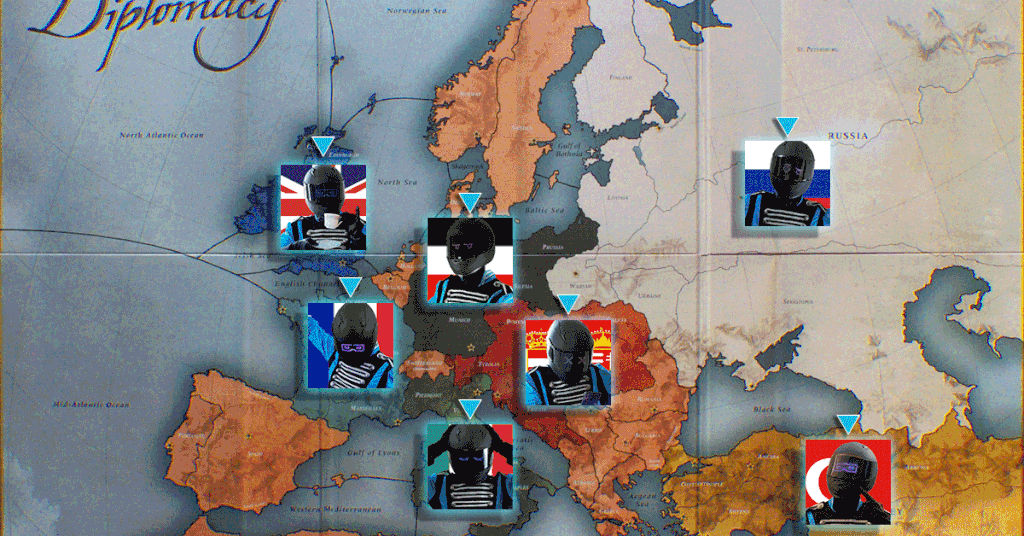
The Great Powers of Diplomacy are as different as characters in a tournament fighting video game, factions in a strategy game, or decks in a deck-building game. But unlike those other games, Diplomacy does not allow the players to choose a character, faction, or deck. The Great Powers are randomly assigned.
Since you can’t “choose your character” on a character selection screen (to match your preferred play style), Your Bored Brother advises you to “choose your character” in the persona sense of the word “character” and adapt your play style to your assigned power.[2]At the risk of patronizing you, dear reader: the title of this piece is a play on words.

Just How Different are the Great Powers?
Each of the Great Powers in Diplomacy stands a reasonable chance of winning, but the powers are not created equal. Not only are they unequal, they are each unique.
- England is an island and cannot possibly win without successfully executing many convoy orders. The other six powers could all realistically solo win without ever successfully convoying, and in practice some powers rarely or almost never convoy.
- France can reach 18 supply centers by capturing only a single landlocked center: Munich. All other centers France needs to capture can be contested by fleets. All other powers must capture 2 or more landlocked centers.[3]Check out my Gunboat Solo Win Guides to learn more about this.
- Germany has five neighbors.[4]Not everyone thinks of Italy as Germany’s neighbor, but Germany and Italy are indeed neighbors. The other powers have only three or four neighbors.[5]England, France and Turkey have three neighbors. Italy, Austria, and Russia have four. I sometimes say in passing that Russia plays more like a central power (Germany, Italy, Austria) than a corner power (England, France, Turkey), despite Russia technically occupying a corner. I think … Continue reading
- Russia is the only power with home centers (ports!) on both sides of the traditional North/South divide.[6]If you need help visualizing this, click here to check out some colored maps.
- Italy stands a reasonable chance of conquering some, or even nearly all, of the home centers of any of the other six powers.[7]Check out my Gunboat Solo Win Guide for Italy to see this visualized. The other six powers almost invariably conquer the home centers of their immediate neighbors, or have at least one distant rival who is out of their reach in a competitive Diplomacy match.
- Austria is the only power with one port; the others have two or three. Not only that, but Austria’s sole port (Trieste) is awkwardly located.
- Turkey is further away from “crossing the stalemate line” than any other power. Turkey requires 5 moves to reach Marseilles, Spain, Munich, or Berlin. Although St. Petersburg is closer at 4 moves away, St. Petersburg cannot be permanently defended from the South. Each of the other powers is 2 or fewer moves away, except for England who is 4 away.[8]Russia is the closest of all seven powers, as Russia starts on both sides of the line. Germany is 2 moves away from many Southern centers (Venice, Trieste, Vienna, Warsaw). Austria is 2 moves from Munich. Italy is 2 moves from Marseilles or Munich. France 2 moves from Venice and 3 from Tunis. … Continue reading
I chose this list of examples to strike you with how each of the seven Great Powers is meaningfully unique. This is by no means an exhaustive statement of all the differences between the powers.
I have an idea of what some readers might be thinking: “Okay BrotherBored, so each of the powers is unique. Now I can do better at the next Diplomacy bar trivia night. How does contemplating these differences help me win?”
What does it mean to “Choose Your Character?”
Strategizing your Diplomacy match as each Great Power should be as different as planning a road trip in a totally different vehicle. Yes, it is possible to drive across the country in a car, bus, RV, motorcycle, electric vehicle, etc.—and it is possible to solo win as any of the seven Great Powers—but the task is not the same.
I commonly encounter players who declare that they have a “play style.” The implication is that these players approach every match of Diplomacy a similar way, regardless of which power they’re assigned at the start of the match. Is this you? If you follow a one-size-fits-all-Great-Powers approach to Diplomacy, I’ll wager that that you are successful with certain powers, and have a poor track record with others.
Diplomacy (at least, Press Diplomacy) is a balanced game in which all seven Great Powers stand a reasonable chance of winning. The Great Power you do poorly with doesn’t “suck;” it’s you who are limited.

If you consider yourself to have a “play style” or “personality” or “approach” that you take with you into every match, then this is my advice: open your mind.
Planes, Trains, and Automobiles
The average human being can, with training, drive a car, ride a bike, pilot a boat, and so on. But wouldn’t you be suspicious of the competence of a person who spoke and acted as though the skills required to control any vehicle (tank, skateboard, WaveRunner) “are basically the same?” I am confident that any able-bodied reader of my blog could learn to get around in any of these craft, but I think almost anyone would concede that the skills required are not the same skills and that mastery of each requires its own study or practice.
Do you find yourself getting some solo wins as, say, England…but never as Germany? You may be trying to drive an 18-wheeler as though it is a convertible.
I’m making an extreme comparison here by analogizing Diplomacy countries to all manner of vehicles, but that’s the point—I’m trying say something surprising so as to open your mind to learning.
Likewise, I am confident that you can learn how to vary your play style according to the particular power you are assigned in a given Diplomacy match. But in order to learn how to do this, you must first admit to yourself that it is true that each of the seven powers requires a different approach.
Maybe this vehicles analogy seems silly. Let me instead compare the Great Powers of Diplomacy to the starting points of other games.
Other Games with Asymmetrical Starts
In the deck-building game Magic: the Gathering, the players customize their decks to focus on a particular strategy, such as all-out attacking from the start (usually called “aggro”) or playing defensively while accruing incremental advantages (“control”). Generally speaking, a Magic: the Gathering deck is very poor at pursuing a strategy that it was not created to do. So if you prefer playing defensively while looking for small advantages, you should choose a control deck. An aggro deck will simply lack the cards that make a control strategy possible. And even if a control strategy is your favorite, you should pursue an aggro strategy if you play an aggro deck.
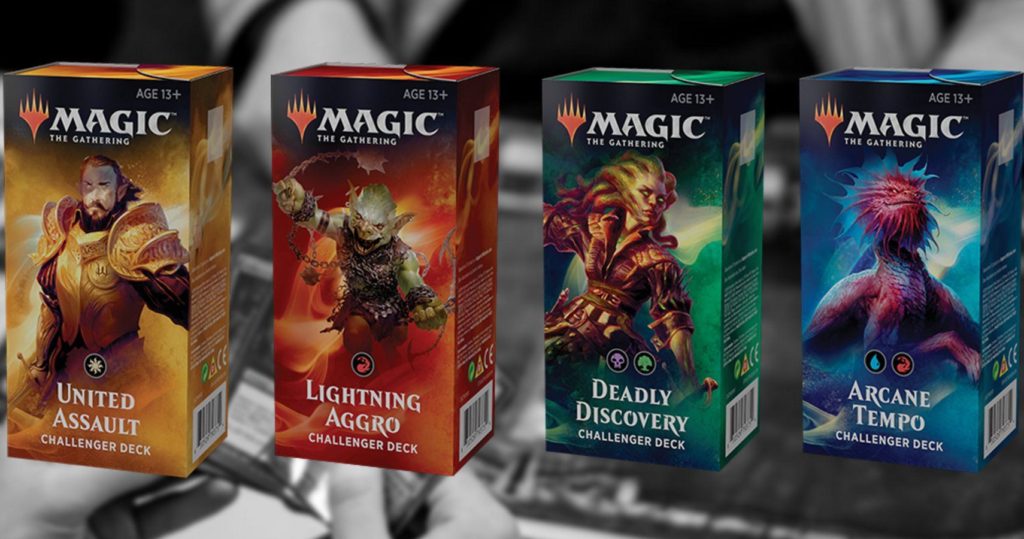
There are also many video games with this sort of asymmetrical design. Real-Time Strategy (where players typically select a faction with unique units), Multiplayer Online Battle Arena and “Hero Shooters” (where players enter a fight playing as a character with unique combat abilities), and Tournament Fighting games (again, players choose a unique character) come to mind. Players who master these games understand that a different approach or “play style” is required maximize the special advantages of the factions or characters they can choose from.
There is one HUGE difference between Diplomacy and these other games I’ve mentioned:
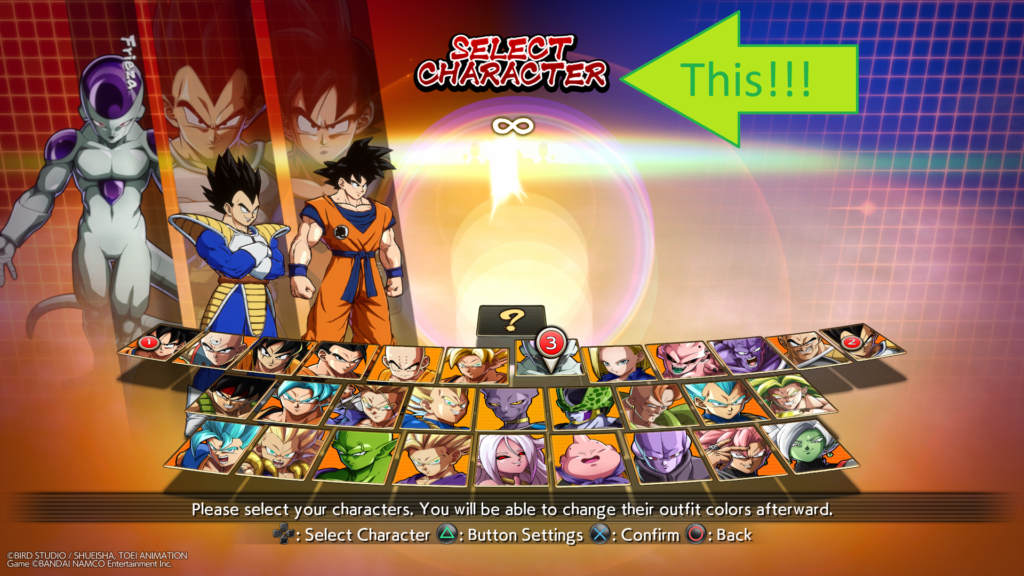
When you play Magic: the Gathering, you can choose a deck that suits your desired play style. When you play a Real-Time Strategy game, you can choose the faction that has the units you want to use. When you play a game with a character selection screen, you can choose the character you understand best how to play.
Unlike all the other games I mentioned, in Diplomacy the powers are randomly assigned. Compared to most modern games, Diplomacy’s random power assignment is an oddity of game design.
This blog is full of my speculations on human psychology, so the following conjecture should come as no surprise to a familiar reader: I think Diplomacy’s lack of a character-selection screen causes some players to psychologically dissociate from “being” the Great Power randomly assigned to them. To use a term popular in American parlance today, they lack a “sense of ownership” because they didn’t choose to play as that Great Power. This leads them to ignore (or resist) the idea that each power benefits from a special play style.
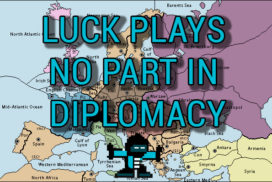
The assignment of the Great Powers in Diplomacy is pure luck.[9]Unless you’re playing with house rules that let players’ somehow choose their power, like the BrotherBored Gunboat League! There are also some tournament rules that give players a say in which power they are assigned. This one rule really stands out, as the other rules of Diplomacy necessitate no other randomly generated information. I’ve written before about how Diplomacy players (like human beings in general) have a tendency to conflate “that which is beyond my control” and “that which is beyond my influence” into the singular concept of “luck,” and by this sloppy thinking they limit themselves from perceiving the full extent of their powers of self-determination.

But even when you correctly assess a fact or event as beyond your influence (like the randomization of the powers at the start), you haven’t necessarily escaped the psychological trap. Maybe getting assigned your least favorite power isn’t your fault, but it is still your problem. You might ignore the implications of your power assignment…or you might adapt your play style to account for it.

If high-level Magic players were randomly assigned which kind of deck to play, would those players play to the strengths of the decks assigned to them…or would they insist on playing the deck according to their “natural” or “preferred” style? This should not be a challenging question.
In Diplomacy, you do not get to choose to play the power with the capabilities that conform to your preferred play style. You just don’t. So if you want to maximize your chances of winning, you should alter your play style to conform to the power that you have been assigned.
Getting into Character!
Although anything is possible in Diplomacy, it is beyond question that each of the Great Powers has inherent capabilities, advantages, and limitations. Those advantages and limitations (and how to exploit or work around them) circumscribe what is possible. These differences define which tactics are “conservative” or “risky”—and counsel whether such play is wisdom or folly!
To be clear, I’m not advising you to approach your matches with a cookie-cutter plan for each power; that would be as self-limiting as ignoring the the powers’ differences. Rather, I am advising you to think of each power as having unique interests, goals, and dangers, and a natural way of approach the game that arises from all that. Adjust your “character” to make sense for the “character” you’ve been assigned.
For an example of how Your Bored Brother “gets into character,” let’s look at an excerpt from the journal I kept for one of my first round matches in the 2019 Online Diplomacy Championship:
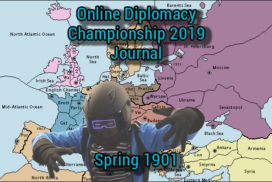
English Short-term Goals (up through the end of 1902):
– Keep France from opening to English Channel. Whether I open there or not, I don’t want France opening there. If France starts off with that opening, my strategic and tactical choices will be severely limited for several turns.
– Discourage as many northern fleet builds as I can. Ideally, I will persuade Germany to build zero fleets, Russia not to build in St. Petersburg (2nd-best-case-scenario would be an army build, 3rd best would be a fleet build on the south coast), and France to build zero fleets (or else build a second fleet in Marseilles). Usually Russia can be encouraged to do this, often Germany, and rarely France.
– Gain a foothold with my army. Usually this means landing the starting army in Norway, but Belgium, Picardy, or Brest is sometimes workable (in that order of likelihood). Any attempt to convoy to Denmark or Holland almost always fails.
– My short-term goals require me to devote my attention to Germany, France, and Russia. Italy, Austria, and Turkey matter to me, but what they do is not an immediate concern.English Long-Term Goals:
Your Bored Brother
– If I am to solo win, I need to either (1) Break through into the Mediterranean early so that I have a shot at capturing Tunis, which means destroying France early; or (2) Have a realistic chance of capturing Moscow, which usually means destroying Russia early.
– Protect Austria. If Austria gets blasted away, usually England has a poor game. A related goal is to persuade Italy to attack France. This weakens France, discourages France from building fleets to use against me, and strengthens Austria.
– In the long run, I will need a good relationship with Italy, Austria, and/or Turkey. If I am to solo win, I need to keep those powers divided against each other and on my side (or at least, unable to act in concert to block a solo win attempt from me).

what’s my motivation?
My journal entry goes on and on like that, Your Bored Brother taking mental inventory of what it means to play as England. Before sending or receiving any messages, I was able to write extensively about my goals as England, my opening move possibilities, and my alliance options with my neighbors.[10]My ODC 2019 Journal is not the only place to find a general guide for how to think and play as England; numerous players have made such guides! LegendaryTactics has made several country-specific videos though, such as How to Win as England. And on this blog, Eden published his Diplomacy Dossier on … Continue reading
At the time I wrote the journal I am quoting from, I had played Diplomacy for more than 10 years. I had probably played as England 20-30 times before. And yet, I still went through the motions of getting into character as England. I think the effort to think through my goals in a clear, organized way pays off. Even a veteran player like myself can make mistakes due to hasty or sloppy thinking, and I like to avoid that.
By the way, I got a strong result in this match—in fact, I got a strong result in all four of my pre-finals matches.[11]I even hung in there in the Final Round as Turkey, recovering from just 2 centers into a strong-ish position before later getting backstabbed and completely eliminated. DiploStrats did a full 5+ hour commentary on that match—click here if you want to watch me get ground to a nub, recover quite a … Continue reading

How “Getting into Character“ Helps
Diplomacy is not a social deduction game, and Diplomacy is not just a popularity contest. Those players who completely depend on the social aspect of the game will eventually be outplayed by those who understand both the social aspect and the objective constraints of the map and game pieces.
Without knowledge of how a given Great Power functions, you can be manipulated into making poor choices. How do you evaluate a rival’s offer if you don’t have an idea of what constitutes your interests?
Bouncing fleets in English Channel means something different to England than to France. Capturing St. Petersburg means something different to Germany than to Austria. Italy going down fast means something different to Russia than to Turkey.
Let’s say you’re England, and the French player says “let me move into English Channel for my opening move and I’ll be your best friend.” With all the authority I can muster as an experienced Diplomacy player, I say: You should react with skepticism to an offer of this sort. Any practical experience in playing Diplomacy, any theoretical knowledge of the game, will inform you that this is likely a ruse or at least bad deal.
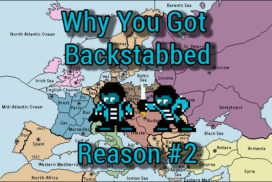
If you’re going to take a bad deal, or make an immediate show of trust, you should expect some big strategic payoff later. That would make taking the risk worthwhile.
Do you know what constitutes a big strategic payoff for the power you’re playing? The powers don’t all have identical strategic interests.
Play Your Part
As a mentor, by far the most common question I get is a variation of “What should I be saying to [insert country name here]?”
My answer is invariably another question: “What do you want that player to do?”
If you can’t answer the question of what you might want another player to do, then you don’t have a starting point for your conversations. You risk your press being confused and aimless…and you’re likely to be tricked into going against your own best interest.
I believe that the most common mental weakness of inexperienced players is that they use their rivals’ press as the starting point for their strategy and tactics—instead of using their own goals as the basis of their press with their rivals.

You should know the basic goals of the power you’ve been assigned, and consider them at the start of each match. Once you are “in character,” you can assess whether your rivals are asking a lot of you, or asking only a little. It can be wise play to deviate from a power’s natural interests. You won’t win in Diplomacy without taking some risks. But to wisely take a risk, you must compare the value of what you are risking and the value of what you might gain—and that calculation is simply not possible without a clear understanding of what is valuable to your power. Take risks, but don’t “break character!”
You Can Do It!
So I’ve advised you to “choose your character,” and by that I mean to advise you to change your approach to Diplomacy—your play style—to lean into the quirks of the Great Power you’ve been assigned. This isn’t just about tactical minutiae (although that is certainly a part of what I am saying). My advice is also about approaching the match itself in a way conducive to the victory of the power you were assigned.
“Get into character” sounds so simple, but of course the simplest thing can be quite difficult. Developing different styles of playing Diplomacy is easier said than done.
But it can be done—and you can do it! It will probably take you many matches, perhaps months or real-world years of time. But every journey starts with a single step. Take the first mental step of at least trying to vary your style to align with the Great Powers’ differences. Once you add this idea to your conscious thought, you will start to recognize on your own how you could be shifting your approach to align with a given power.
There’s more coming soon!
I recognize that this advice is fairly abstract. Indeed, I originally drafted this article as an introduction to a larger piece that went on to give specific “character” advice for all seven Great Powers. I’m working on that article at the same time as this one, and I’ll publish it very soon! Stay tuned!
Footnotes
| ↑1 | I originally sketched this piece out well over a year ago (how time flies!), but never got it into a publishable state. The challenge in writing on this topic is that, though the concept is simple, it is difficult to describe succinctly. I think I felt unsatisfied with my prior drafts because I want to describe the broad philosophical concept that a player can adapt their play style to suit the country they were assigned (and why this is advantageous) and also give examples of how this can be done for particular countries. These concepts are (in my mind) quite distinct, but it is difficult to appreciate one without the other. However, I struggled to write a single article that clearly articulates both.
An earlier version of this article was massive, nearly 10,000 words, and difficult to follow. So what I’ve done is break it into two parts. The first part (this article) is called “Choose Your Character,” and is about the broad concept of adapting one’s play style to suit the power one has been assigned. The second part (a forthcoming article) is called “Embrace the Powers’ Differences” and includes country-by-country advice on play styles. |
|---|---|
| ↑2 | At the risk of patronizing you, dear reader: the title of this piece is a play on words. |
| ↑3 | Check out my Gunboat Solo Win Guides to learn more about this. |
| ↑4 | Not everyone thinks of Italy as Germany’s neighbor, but Germany and Italy are indeed neighbors. |
| ↑5 | England, France and Turkey have three neighbors. Italy, Austria, and Russia have four. I sometimes say in passing that Russia plays more like a central power (Germany, Italy, Austria) than a corner power (England, France, Turkey), despite Russia technically occupying a corner. I think Russia’s larger number of neighbors is the reason I feel this way. |
| ↑6 | If you need help visualizing this, click here to check out some colored maps. |
| ↑7 | Check out my Gunboat Solo Win Guide for Italy to see this visualized. |
| ↑8 | Russia is the closest of all seven powers, as Russia starts on both sides of the line. Germany is 2 moves away from many Southern centers (Venice, Trieste, Vienna, Warsaw). Austria is 2 moves from Munich. Italy is 2 moves from Marseilles or Munich. France 2 moves from Venice and 3 from Tunis. England is 4 moves from Tunis or Moscow. |
| ↑9 | Unless you’re playing with house rules that let players’ somehow choose their power, like the BrotherBored Gunboat League! There are also some tournament rules that give players a say in which power they are assigned. |
| ↑10 | My ODC 2019 Journal is not the only place to find a general guide for how to think and play as England; numerous players have made such guides! LegendaryTactics has made several country-specific videos though, such as How to Win as England. And on this blog, Eden published his Diplomacy Dossier on England. |
| ↑11 | I even hung in there in the Final Round as Turkey, recovering from just 2 centers into a strong-ish position before later getting backstabbed and completely eliminated. DiploStrats did a full 5+ hour commentary on that match—click here if you want to watch me get ground to a nub, recover quite a bit, and then finally get crushed in the end. |

